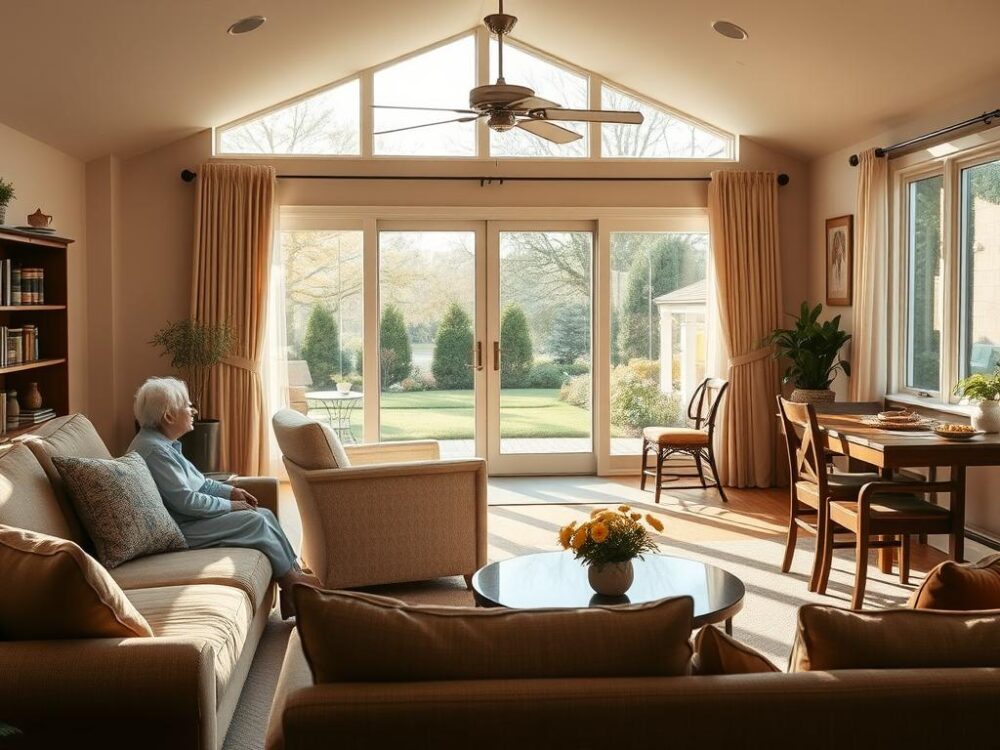
Find Care Homes Near Me | Senior Living Support
March 5, 2024
Understanding Nuesing Homes: Your Guide
March 5, 2024Are you searching for the best long-term care facilities near you? When it comes to the well-being of your loved ones, quality care and comfort are of utmost importance. Finding the right facility that can provide the level of care and support they need can be a daunting task. However, with the right resources and information, you can make an informed decision.
At Extended Home Care, we understand the significance of choosing a suitable long-term care facility. We have compiled a comprehensive guide to help you navigate the process. We have researched and analyzed various long-term care facilities in your area, considering ownership, certification status, and performance history.
Our sources include the California Health Facilities Information Database (Cal Health Find) and Nursing Home Compare, which provide detailed information about licensed long-term care facilities. By leveraging these resources, you can gain insights into the facilities’ quality of care, ensuring that your loved ones receive the best possible support.
Whether you are looking for an assisted living facility, nursing home, or specialized care center, our guide will assist you in finding the perfect match. We understand that the well-being and happiness of your loved ones are paramount. Let us help you find the ideal long-term care facility that offers exceptional care, ensuring the comfort and well-being of your loved ones.
Finding Long-Term Care Facilities in California
In California, finding the right long-term care facility for your loved one is made easier with the help of two valuable resources: Cal Health Find and Nursing Home Compare.
Cal Health Find
The Cal Health Find website, maintained by the California Department of Public Health, provides comprehensive information about licensed long-term care facilities in the state. This includes ownership details, certification status, and performance history of each facility. Cal Health Find is an essential tool in your search for California long term care facilities, offering transparency and insight into the quality of care provided.
Nursing Home Compare
Another valuable resource is Nursing Home Compare, a federal government website that allows consumers to compare information about nursing homes across the country. This tool provides detailed data on quality of care, staffing levels, and health inspections. By utilizing Nursing Home Compare, you can make informed decisions and ensure that the California long-term care facility you choose meets your expectations.
Both Cal Health Find and Nursing Home Compare are designed to assist you in finding the most suitable long-term care facility in California. With easy access to information about ownership, certification, performance, and quality of care, you can make a well-informed decision for your loved one’s future.
Online Complaints and Investigations
Consumers must have an avenue to voice their concerns and file complaints when it comes to the quality of care in long-term care facilities. With Cal Health Find, individuals can file online complaints regarding specific healthcare facilities, ensuring that issues or concerns are addressed promptly and effectively.
Once a complaint is filed, it is forwarded to the appropriate Licensing and Certification District Office for investigation. This process ensures that allegations of improper care or other violations are thoroughly examined and addressed. By investigating these complaints, the authorities can take appropriate actions to rectify any issues and ensure the well-being of the residents.
By offering a platform for consumers to file complaints and facilitating investigations, Cal Health Find plays a crucial role in maintaining the quality and safety of long-term care facilities across the state. It allows individuals to actively participate in the oversight and accountability of these facilities, ultimately contributing to the overall improvement of care standards.
Having a transparent complaint and investigation process instills confidence in the public and reassures families that their loved ones are receiving the best possible care. Whether it’s issues related to neglect, abuse, or other concerns, filing a complaint through Cal Health Find empowers individuals to take action and advocate for the well-being of their loved ones.
Cost of Long-Term Care Facilities
When considering long-term care facilities, it’s important to understand the cost involved. According to the Genworth Financial survey, the median monthly cost for a semi-private room in a nursing home is $7,908, while a private room costs $9,034 per month. These costs can vary depending on the state and the level of care provided.
Private funds, such as long-term care insurance or personal assets, primarily pay for long-term care facilities. Long-term care insurance helps cover the cost of nursing homes, assisted living, and in-home care. It provides financial protection and ensures that you or your loved ones receive the care they need without depleting personal savings.
Medicaid is another option to cover the cost of nursing home care. Medicaid is a joint federal and state program that provides health coverage for low-income individuals and families. Medicaid covers most nursing home costs, but individuals may need to spend down their assets to qualify. It’s important to note that Medicaid eligibility requirements vary by state.
It’s worth mentioning that Medicare does not cover long-term care. While Medicare provides coverage for certain health services, including hospital stays and skilled nursing care, it is not designed to pay for long-term stays in nursing homes or custodial care.
Considering the high cost of long-term care, it’s essential to plan ahead and explore different financing options, such as long-term care insurance and Medicaid coverage, to ensure that you or your loved ones can afford the care they need. Consulting with a financial advisor or an elder law attorney can provide valuable guidance and help you make informed decisions regarding your long-term care financial planning.
Summary:
- The median monthly cost for a semi-private room in a nursing home is $7,908, while a private room costs $9,034.
- Private funds, such as long-term care insurance or personal assets, primarily pay for long-term care facilities.
- Medicaid covers most nursing home costs, but individuals may need to spend down their assets to qualify.
- Medicare does not cover long-term care.
Medicare Coverage for Skilled Nursing Care
Medicare provides coverage for skilled nursing care under specific circumstances, but it is important to understand its limitations. While Medicare does cover qualified expenses for up to 100 days of nursing care per benefit period, it is not intended to pay for long-term stays in nursing homes or custodial care.
If a doctor has referred a patient to a Medicare-licensed nursing facility following discharge from a hospital, Medicare can cover the cost of skilled nursing care for a limited duration. During this period, Medicare will pay for medically necessary services, such as physical therapy or intravenous medications. However, after 100 days, the patient is responsible for covering the fees through personal funds or another insurance program.
Understanding Medicare Coverage for Skilled Nursing Care
Medicare coverage for skilled nursing care is contingent upon meeting specific criteria:
- The patient must have a qualifying hospital stay of at least three consecutive days, which includes the day of discharge.
- The hospital stay must be followed by admission to a Medicare-licensed skilled nursing facility within 30 days.
- The patient must require skilled nursing care or rehabilitative services, such as physical therapy, on a daily basis.
- The care provided must be deemed medically necessary and ordered by a doctor.
It is essential to note that Medicare does not cover custodial care, which includes assistance with activities of daily living, such as bathing, dressing, or eating. Medicare coverage for skilled nursing care is meant to assist individuals in their recovery following an illness or injury.
Questions to Consider When Choosing a Nursing Home
There are several important factors to consider when choosing a nursing home. These include the home’s licensing and certification status, safety record, cleanliness, and the ratio of nurses to residents. It is also essential to consider the services provided and the cost. Additionally, you should look at the experience and leadership of the facility, the quality of the food, the suitability of the rooms for ill or disabled seniors, and the availability of social activities and specialized care for conditions like dementia.
- Does the nursing home have a valid license and certification? This ensures that the facility meets the required standards for care.
- What is the safety record of the nursing home? Are there any past incidents or violations that raise concerns?
- How clean is the facility? Maintaining a clean and hygienic environment is crucial for the well-being of residents.
- What is the staff-to-resident ratio? Sufficient staffing is essential to ensure that residents receive proper care and attention.
- What services are provided by the nursing home? Consider your loved one’s specific needs and whether the facility can accommodate them.
- What is the cost of the nursing home? Determine if it fits within your budget and if there are any additional fees or expenses.
- What is the experience and leadership of the facility? Look into the qualifications and expertise of the management team.
- Is the food high quality and suitable for seniors with specific dietary needs?
- Are the rooms comfortable and suitable for ill or disabled seniors?
- Are social activities and recreational programs available to keep residents engaged and fulfilled?
- Does the nursing home provide specialized care for conditions like dementia if needed?
Taking the time to consider these questions will help you make an informed decision and choose a nursing home that provides the best care and comfort for your loved one. Illustration by Sebastien Decoret
How to Pay for Nursing Home Care
Nursing home care can be paid for in different ways depending on an individual’s financial situation and available resources. Here are some common methods of payment:
- Private or Personal Funds: Many individuals pay for nursing home care using their savings, investments, or other assets. Long-term care insurance is also an option to cover the expenses.
- Medicaid: Medicaid is a federal and state program that provides coverage for long-term care services, including nursing home care. To qualify for Medicaid, individuals may need to spend down their assets according to the program’s eligibility requirements.
- Medicare: Medicare, a federal health insurance program for individuals aged 65 and older, only covers skilled nursing care for a limited time. It does not typically cover the long-term care costs associated with nursing homes.
- Veterans’ Benefits: Veterans may be eligible for benefits such as Aid and Attendance, which can help cover the costs of nursing home care.
In considering payment options, it is important to assess personal funds, explore insurance coverage, consult with financial advisors or elder law attorneys, and determine eligibility for government programs like Medicaid or veterans’ benefits.
Planning Ahead with Long-Term Care Insurance
Long-term care insurance can provide financial support for nursing home care. It typically covers the costs associated with long-term care services, including assisted living and nursing home facilities. Planning and obtaining long-term care insurance can help alleviate financial burdens and provide peace of mind.

Seeking professional advice to understand the terms, benefits, and limitations of long-term care insurance policies is crucial. Insurance experts can guide individuals in making informed decisions based on their specific needs and budget.
Ratings and Reviews of Nursing Homes
When it comes to choosing a nursing home for your loved ones, it’s crucial to consider the facility’s ratings and reviews. One reliable source for this information is U.S. News & World Report. This publication rates nursing homes based on their performance in both long-term and short-term care. By reviewing these ratings, you can gain insights into a facility’s safety record, the quality of care provided, and the overall satisfaction of residents.
Why Ratings and Reviews Matter
Rating and review systems play a vital role in helping families make informed decisions about nursing homes. They provide valuable feedback from residents and their families who have firsthand experience with the facilities. By reading these reviews, you can gauge the level of resident care, the effectiveness of the nursing staff, and the overall atmosphere of the facility.
Understanding Safety Records
One important aspect to consider when reviewing nursing home ratings is the safety record of the facility. A good safety record indicates that the nursing home prioritizes the well-being and security of its residents. Look for information on whether the facility has had any instances of abuse or neglect, and whether they have taken appropriate measures to address and prevent such incidents.
Quality of Resident Care
The quality of resident care is another crucial aspect to assess when reviewing nursing home ratings. Look for ratings that specifically mention the level of attention and care provided by the staff and the facility’s adherence to healthcare protocols and guidelines. Positive ratings in this category indicate that the facility is committed to delivering high-quality care to its residents.
Residents' Overall Satisfaction
Lastly, pay attention to residents’ overall satisfaction with the nursing home. Positive ratings and reviews from residents and their families reflect a positive living environment, meaningful engagement, and a sense of community within the facility. Consider the experiences of those who currently or previously resided in the nursing home to gain a better understanding of the overall resident experience.
By reviewing ratings and reading reviews from sources like U.S. News & World Report, you can make a more informed decision about the best nursing home for your loved ones. Remember to consider the safety record, the quality of care provided, and the overall satisfaction of residents to ensure that you find a facility that meets their needs and offers peace of mind for you and your family.
Nursing Homes Near You
Are you searching for a nursing home in your area? Finding the right facility for your loved ones is crucial, and there are online resources that can assist you in this process. By utilizing search capabilities based on location, you can easily find nursing homes near you.
These online resources allow you to search by ZIP code, city, or county, providing a comprehensive list of nursing homes in your desired area. This makes it convenient for you to locate facilities that are conveniently located for visits and easily accessible for your loved ones.
Whether you are looking for a nursing home close to your own residence or near a particular neighborhood, these search capabilities will ensure that you have access to a variety of options to choose from.
Start your nursing home search today and find the perfect facility that meets the needs and preferences of your loved ones.
Benefits of Long-Term Care Facilities
Long-term care facilities provide numerous benefits for individuals in need of professional care and specialized services. These facilities offer around-the-clock care and support, ensuring that residents’ needs are always met.
One key advantage of long-term care facilities is the availability of professional care. They have highly trained staff, including nurses and caregivers, who are experienced in providing personalized care for individuals with diverse medical and functional needs. This professional care ensures that residents receive the medical attention and assistance they require, promoting overall well-being and improving quality of life.
Moreover, long-term care facilities offer specialized services tailored to the unique needs of their residents. Whether it’s assistance with activities of daily living, medication management, physical therapy, or memory care for individuals with dementia, these facilities have dedicated programs and expertise to address specific health conditions and support residents in their daily lives.
In addition to professional care and specialized services, long-term care facilities also prioritize social activities and engagement. They understand the importance of providing a vibrant and fulfilling environment for residents, promoting social interaction and mental stimulation. These facilities organize various social activities, such as group outings, recreational programs, and hobby clubs, fostering a sense of community and enhancing residents’ social well-being.
Overall, long-term care facilities offer a comprehensive support system for individuals in need of ongoing care. With their professional care, specialized services, and social activities, these facilities ensure that residents receive the physical, emotional, and social support necessary to lead fulfilling lives.
Touring Long-Term Care Facilities
When considering a long-term care facility, it is important to schedule a tour. This allows you to get a firsthand look at the environment and assess if it meets your expectations and requirements for your loved ones.
During the tour, pay attention to the cleanliness of the facility. A clean and well-maintained environment is essential for the health and well-being of the residents. Look for signs of cleanliness in both the common areas and individual rooms.
Observe how the residents engage with one another and with staff members. A friendly and engaged atmosphere indicates that the residents are content and well-cared for. This is a positive sign that the facility prioritizes resident engagement and social activities.
Take note of the amenities and services offered by the facility. Consider the specific needs and preferences of your loved ones, and ensure that the facility can provide the necessary support and resources. This may include specialized care for medical conditions, recreational activities, and access to amenities such as outdoor spaces or therapy areas.
Assess the level of care provided by the staff. Look for friendly and compassionate interactions between staff and residents, as this is indicative of a nurturing environment. Additionally, inquire about staff-to-resident ratios to ensure that there are enough caregivers to provide personalized attention and care.
Touring long-term care facilities allows you to gather valuable information and make an informed decision about the best facility for your loved ones. By assessing cleanliness, resident engagement, and the level of care provided, you can find a facility that meets their needs and ensures their comfort and well-being.
Conclusion
Finding the best long-term care facility near you requires careful consideration of various factors. Cost, quality of care, services provided, and resident satisfaction are crucial to evaluate. To make an informed decision, utilize online resources like Cal Health Find and Nursing Home Compare. These platforms allow you to gather detailed information about long-term care facilities near you, including ownership, certification status, and performance history. By comparing facilities in your area, you can choose the one that best meets the needs of your loved ones.
Additionally, take the time to tour potential facilities and ask questions. This will give you a firsthand experience of the facility’s cleanliness, atmosphere, and the residents’ level of engagement and contentment. Look for amenities and services that align with your loved ones’ specific needs, ensuring they receive the highest-quality care and comfort.
In conclusion, selecting a long-term care facility involves careful research, comparison, and evaluation. By considering all relevant factors and utilizing available resources, you can find a facility near you that provides the care and support your loved ones deserve.
FAQ
How do I find the best long-term care facilities near me?
You can find the best long-term care facilities near you by using online resources that provide search capabilities based on location. These resources allow you to search by ZIP code, city, or county to find nursing homes in your desired area.
What resources can I use to find long-term care facilities in California?
You can use the Cal Health Find website and Nursing Home Compare in California. The California Department of Public Health maintains Cal Health Find and provides detailed information about licensed facilities. Nursing Home Compare is a federal government website that allows consumers to compare information about nursing homes, including quality of care and staffing.
How can I file complaints against long-term care facilities?
You can file complaints against specific healthcare facilities through the Cal Health Find website. These complaints are forwarded to the appropriate Licensing and Certification District Office for investigation, ensuring that consumer concerns are addressed promptly and effectively.
What is the cost of long-term care facilities?
The cost of long-term care facilities can vary, but according to the Genworth Financial survey, the median monthly fee for a semi-private room in a nursing home is $7,908, while a private room costs $9,034 per month. These costs depend on factors such as the state and the level of care provided.
Does Medicare cover long-term care?
No, Medicare does not cover long-term care. Medicare primarily covers skilled nursing care in certain situations and for a limited time. After 100 days of nursing care, the patient must cover the fees using personal funds or another insurance program.
What factors should I consider when choosing a nursing home?
When choosing a nursing home, it is essential to consider factors such as licensing and certification status, safety record, cleanliness, ratio of nurses to residents, services provided, cost, experience and leadership of the facility, quality of food, suitability of rooms for ill or disabled seniors, and availability of social activities and specialized care.
How can I pay for nursing home care?
Nursing home care can be paid for through private or personal funds, such as long-term care insurance or personal assets. Medicaid covers most nursing home costs, but individuals may need to spend down their assets to qualify. Veterans’ benefits and private long-term care insurance are also potential payment sources.
How can I find ratings and reviews of nursing homes?
U.S. News & World Report rates nursing homes based on their performance in both long-term and short-term care. When considering a nursing home, it is essential to review the facility’s ratings and read reviews from residents and their families to assess factors such as safety record, quality of care, and resident satisfaction.
How do I find nursing homes near me?
To find nursing homes near you, use online resources that provide location-based search capabilities. These resources allow you to search by ZIP code, city, or county, making it easier to find facilities that are conveniently located for visits and easily accessible for your loved ones.
What are the benefits of long-term care facilities?
Long-term care facilities offer several benefits, including around-the-clock care and support, social activities and opportunities for engagement and interaction, and specialized services. These facilities ensure the needs of residents are met at all times, enhancing their overall quality of life.
What should I consider when touring long-term care facilities?
When touring long-term care facilities, it is crucial to assess the cleanliness and overall atmosphere of the facility, observe how engaged and content the residents appear to be, take note of the amenities and services offered, and evaluate the level of care provided by the staff. This will help you make an informed decision about the best facility for your loved ones.




